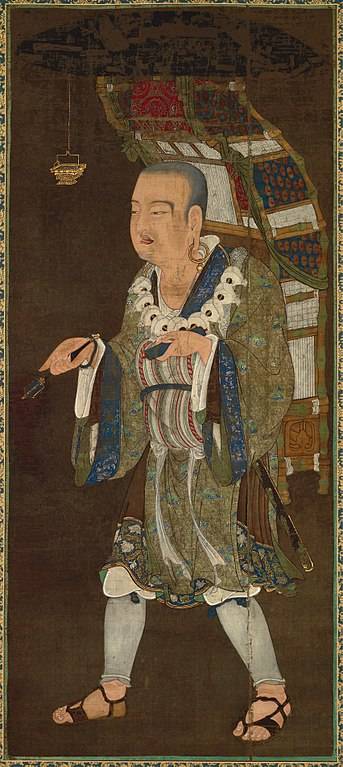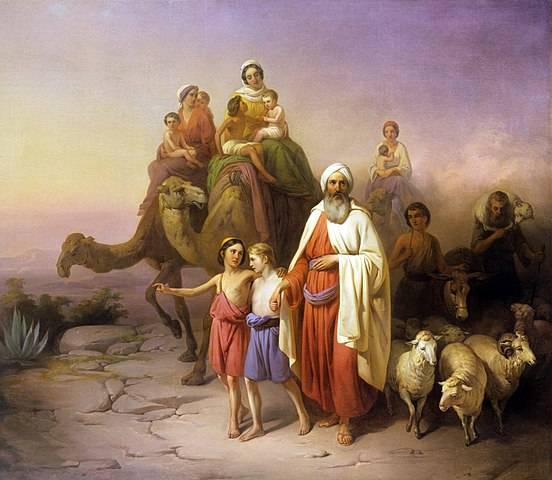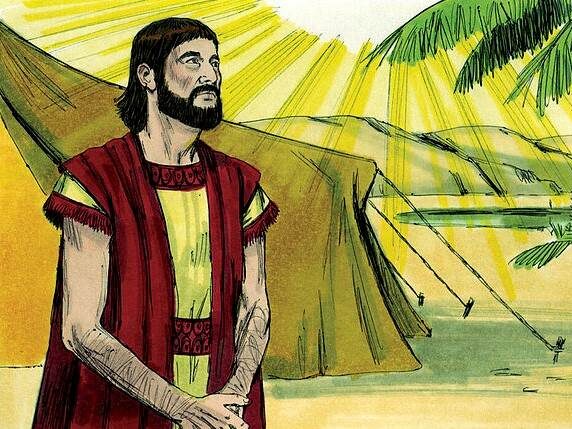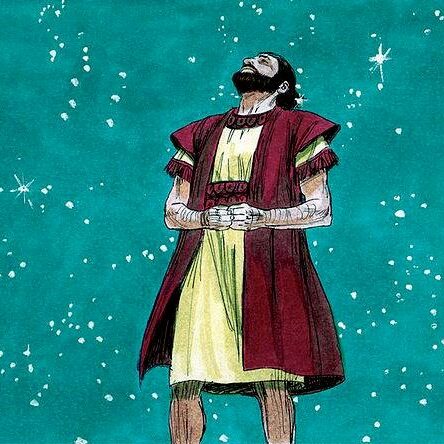Journey to the West (Chinese: 西遊記; pinyin: Xī Yóu Jì ), one of the greatest Classic Chinese Novels, was published during the Ming dynasty. It was also made into a 2016 film called Xuanzang.

Tokyo National Museum, Public domain, via Wikimedia Commons
The novel portrays the legendary pilgrimage of the historical monk Xuanzang, (玄奘; 602–664). He travelled from China, through Central Asia, to India, to obtain sacred Buddhist texts (sūtras). He returned after many trials, writing an account of his travels in Great Tang Records on the Western Regions (大唐西域记).
In Journey to the West, Gautama Buddha tasks the fictional monk Tang Sanzang with the quest. Then Buddha provides him with three protectors who agree to help him to gain merit for their past sins. These disciples are Sun Wukong, Zhu Bajie, and Sha Wujing, alongside a dragon prince who acts as Tang Sanzang’s steed. This group of pilgrims journey towards their destination and enlightenment by the power and virtue of cooperation. Along the way they encounter various demons who hope to negate their sins by eating the pure flesh of Sanzang.
Though an entertaining novel, its setting is bleak. Gautama Buddha seeks a worthy monk to retrieve sacred scriptures because China “knows only greed, hedonism, promiscuity, and sins.” Tang Sanzang’s companions: a pig, monkey, sand monster, and dragon, help him to gain merit to pay for past sins. The demons and animal-spirits attack the pilgrims because they are in bondage to their sins.
Abraham’s Journey to the West
Though not given as a novel but as real history, the ancient Hebrew Scriptures record a similarly bleak setting. It depicts the ancient world plunged into sin, kleshas, and duhkha. After destroying the world with a flood and dispersing the nations, the Creator continued his work to defeat his adversary. Back in the beginning He had outlined his plan through a promise centered on a coming ‘he’. The Creator now starts the process of raising ‘The Woman’ who would bring him forth.

József Molnár, Public domain, via Wikimedia Commons
He did so by calling a pilgrim on a journey to the west. Like Tang Sanzang, this pilgrim would face many hardships. Named Abraham (or Abram), he would never return back to his homeland from this journey. Unlike the Journey to the West novel, we today can experience good karma as a result of his journey. We even hear about the effects of his journey in the news regularly today, so this journey is not a fictional novel. You can reap the good karma of this journey, but only if you can recognize it. Though Abraham went on a literal and physical journey, he also went on a spiritual one. That opened a path (marga) for you and me. We explore how in the coming articles.
Man’s Problem – God’s Plan
The Creator God had a plan. This plan was not something that you and I would expect because it seems far too small and insignificant. But this was the plan that He chose. This plan, transpiring in roughly 2000 BCE (i.e. 4000 years ago), involved calling a man and his family. God promised to bless him and others who choose to receive the blessing. Here is how the Bible records His promise to Abraham:
1 The Lord had said to Abram, “Go from your country, your people and your father’s household to the land I will show you.
2 “I will make you into a great nation,
and I will bless you;
I will make your name great,
and you will be a blessing.
3 I will bless those who bless you,
and whoever curses you I will curse;
and all peoples on earth
will be blessed through you.”4 So Abram went, as the Lord had told him; and Lot went with him. Abram was seventy-five years old when he set out from Harran. 5 He took his wife Sarai, his nephew Lot, all the possessions they had accumulated and the people they had acquired in Harran, and they set out for the land of Canaan, and they arrived there.
6 Abram traveled through the land as far as the site of the great tree of Moreh at Shechem. At that time the Canaanites were in the land. 7 The Lord appeared to Abram and said, “To your offspring I will give this land.” So he built an altar there to the Lord, who had appeared to him.
Genesis 12:1-7

Sweet Publishing, CC BY-SA 3.0, via Wikimedia Commons
Some today wonder if a personal God exists who cares enough to help our troubled lives and give us hope. In this account we can test this question. Here God made a promise to a specific person, parts of which we can verify today. The account records that The Lord directly promised Abraham that ‘I will make your name great’. We now live in the 21st century – 4000 years later. Today the name of Abraham is one of the most globally recognized names from ancient history. Jews and Arabs today trace their ancestry from him. The recent US-sponsored peace plan changing the geo-politics of the Middle East, The Abraham Accords, was named from him. This promise has literally, historically, and verifiably come true.
The Dead Sea scrolls contain the earliest manuscripts of the Bible. They date back to 200-100 BCE. This means that this promise has, at the very latest, been in writing since long before the name ‘Abraham’ became known outside of the Jewish nation. The fulfillment did not come about by simply writing it down after the name of Abraham became known.
…By Means of His Great Nation
If you lived in Abraham’s day and predicted who would be most remembered thousands of years later, you would have bet on the kings, generals, warriors, or court poets living back then, but their names are all forgotten. Yet the man who just barely managed to have a family in the wilderness is a household name around the world. His name is great only because the nation(s) that he fathered kept the record of his account. Thus individuals and nations that came from him became great. This is exactly how God promised it long ago (“I will make you into a great nation… I will make your name great”). No one else in all of history is so well-known only because of descendants coming from them rather than from great accomplishments in their own life.

Sweet Publishing, CC BY-SA 3.0, via Wikimedia Commons
What is equally astonishing is that Abraham really did nothing noteworthy in his life. He achieved nothing that normally makes one’s name ‘great’. He did not write anything extraordinary (like Wu Cheng’en, who wrote Journey to the West). Abraham did not build anything noteworthy (like Emperor Qin Shi Huang, who built the Great Wall of China). He did not lead an army with impressive military skill (like Genghis Khan of Mongolia). Nor was he a statesman (like Confucius), or a teacher (like Gautama Buddha). Abraham did not even rule a kingdom. He did nothing really except camp on his journey to the west, pray in the wilderness, and then have a son.
…Through the Will of the Promise-Maker
And the people today who descended from Abraham – the Jews – were never really a nation which we typically associate with greatness. They did not build great architectural structures like the pyramids of the Egyptians. Certainly they built nothing like the Forbidden City in Beijing. They did not write philosophy like the Greeks, or administer over far-flung colonies like the British did. All of these nations accomplished their achievements as world empires stretching their extensive borders through extraordinary military power.
Great imperial power was never something the Jews ever had. The Jewish people’s greatness is mostly due to the Law and Book (Bible) which they birthed, the remarkable individuals who emerged from their community, and their ability to survive for thousands of years as a distinct and somewhat different people group. Their greatness is not really due to anything they did, but rather what was done to and through them.
The “I Wills” Stamped Into History
Now look to the Person that was going to make this promise happen. Referring back to Genesis 12:1-7, it says repeatedly that “I will…” The unique way their greatness has played out in history fits once again remarkably to this declaration that it was going to be the Creator who would make this happen rather than some innate ability, conquest, or power of this ‘nation’. The media attention paid around the world today to events in Israel, the modern Jewish nation, is a case in point. Do you constantly hear of news events in Singapore, Norway, Papua New Guinea, Bolivia, or the Central African Republic? But Israel, which is similarly-sized to these aforementioned locations in terms of population, is constantly in global news headlines.
Human events have no preset bias for Jewish people. History could have unfolded along so many different paths. Think how likely it was for this promise to have failed in some way. But instead it has unfolded, and continues to unfold, as it was declared those thousands of years ago. Perhaps the power and authority of that ancient Promise-Maker can penetrate the karma that governs our lives.
The Journey Still Shaking the World
As the Bible states:
4 So Abram went, as the Lord had told him…
Genesis 12:4
Abraham set out on a journey to the West, as shown by the map below:

Blessings to Us
This journey extends far beyond Abraham and his physical descendants. The blessing was not only for Abraham, as the Bible also states that:
“…all peoples on earth will be blessed through you.”
Genesis 12:3
This should make you and I take note. Whether you are Korean, Japanese, Thai, or Sri Lankan, or even something else; no matter your religion, be it Buddhist, Taoist, Shinto, Animist, or Atheist; no matter whether you are wealthy or poor, healthy or sick; educated or not – the ‘all peoples on earth’ has to include you also. This promise for a blessing includes everybody alive from back then until today – which means you.
How?
When?
What kind of blessing?
In following the account of Abraham we understand better.
We have just verified historically and literally that the first part of the Promise to Abraham has come true. Do we not then have a reason to trust that the Promise to you and I will also not activate? Because we can see it operating still 4000 years later, we know this promise is not under anicca or samsara. But we need to unlock it – to understand the Promise. We need enlightenment so we understand how this Promise can ‘touch’ us. We find this enlightenment in continuing to follow the pilgrimage of Abraham. The ‘marga’, or path, that this man found becomes a pattern for us. We see this next.